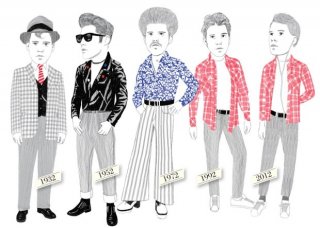did anyone read that piece in a recent issue of Vanity Fair, by kurt anderson that we are living in a period of cultural stasis? he discussed how we are "stuck" fashion-wise recycling the same trends over and over again.
If you open up a copy of Vogue from 20 years ago, you may notice the low prices on garments and accessories...even after accounting for inflation. It seems that brands promised us lower prices after moving production overseas but never passed that value on to consumers. They kept the savings for themselves or shareholders, rather than investing in new technology. He says in the piece "If blue jeans became unfashionable tomorrow, Old Navy would be in trouble. And so on. Capitalism may depend on perpetual creative destruction, but the last thing anybody wants is their business to be the one creatively destroyed. Now that multi-billion-dollar enterprises have become style businesses and style businesses have become multi-billion-dollar enterprises, a massive damper has been placed on the general impetus for innovation and change." So, it seems that the fashion powers-that-be have a vested interest in us buying the same items over and over again.
Even rich, wealthy people who have millions to blow on fashion seem bored it. When asked how this time period in society would be characterized, Daphne Guinness responded, "Corporate." She continued, "There hasn’t been anything real since grunge. That was the last movement led by music or an art form."
The only "new" thing i think that brands/designers could be investing in is high quality digital prints a la mary katrantzou. but why arent they?
image from vf.com
Even rich, wealthy people who have millions to blow on fashion seem bored it. When asked how this time period in society would be characterized, Daphne Guinness responded, "Corporate." She continued, "There hasn’t been anything real since grunge. That was the last movement led by music or an art form."
The only "new" thing i think that brands/designers could be investing in is high quality digital prints a la mary katrantzou. but why arent they?
image from vf.com



 ).
).
 This desire to have everyone look "right" borders on "fascist" imo. A big question that relates to this is whether or not media globalization naturally leads to homogenization.
This desire to have everyone look "right" borders on "fascist" imo. A big question that relates to this is whether or not media globalization naturally leads to homogenization.